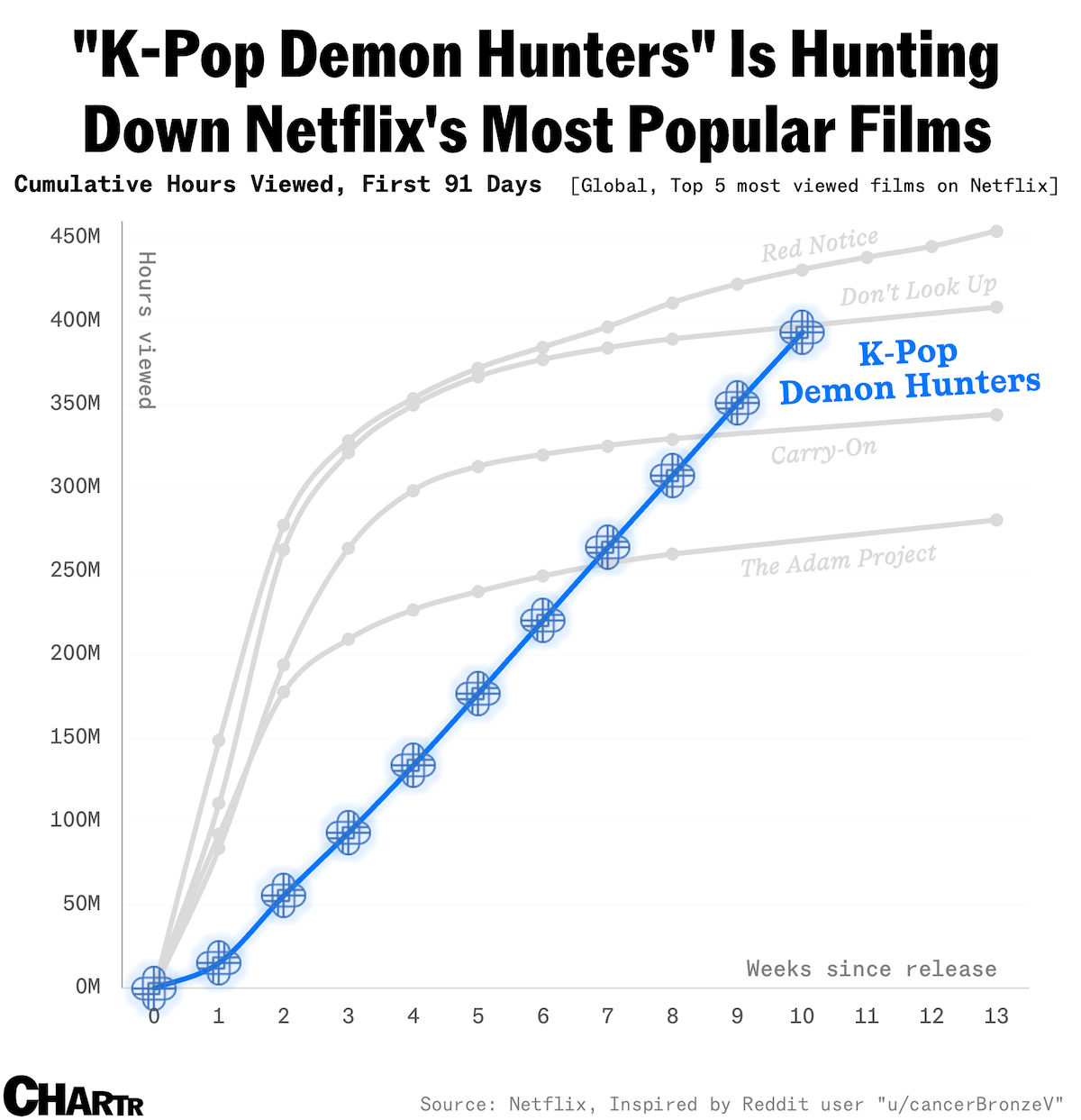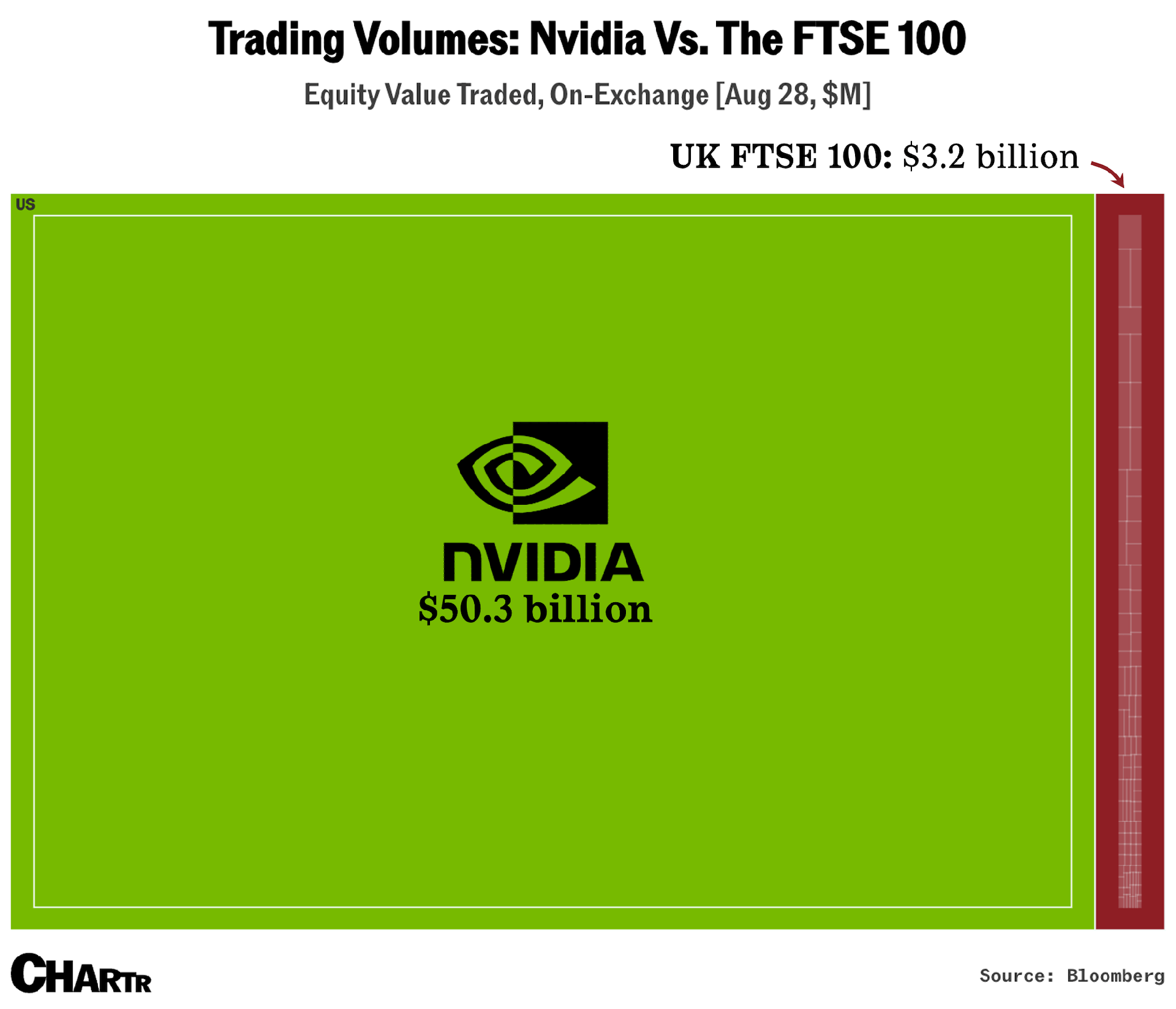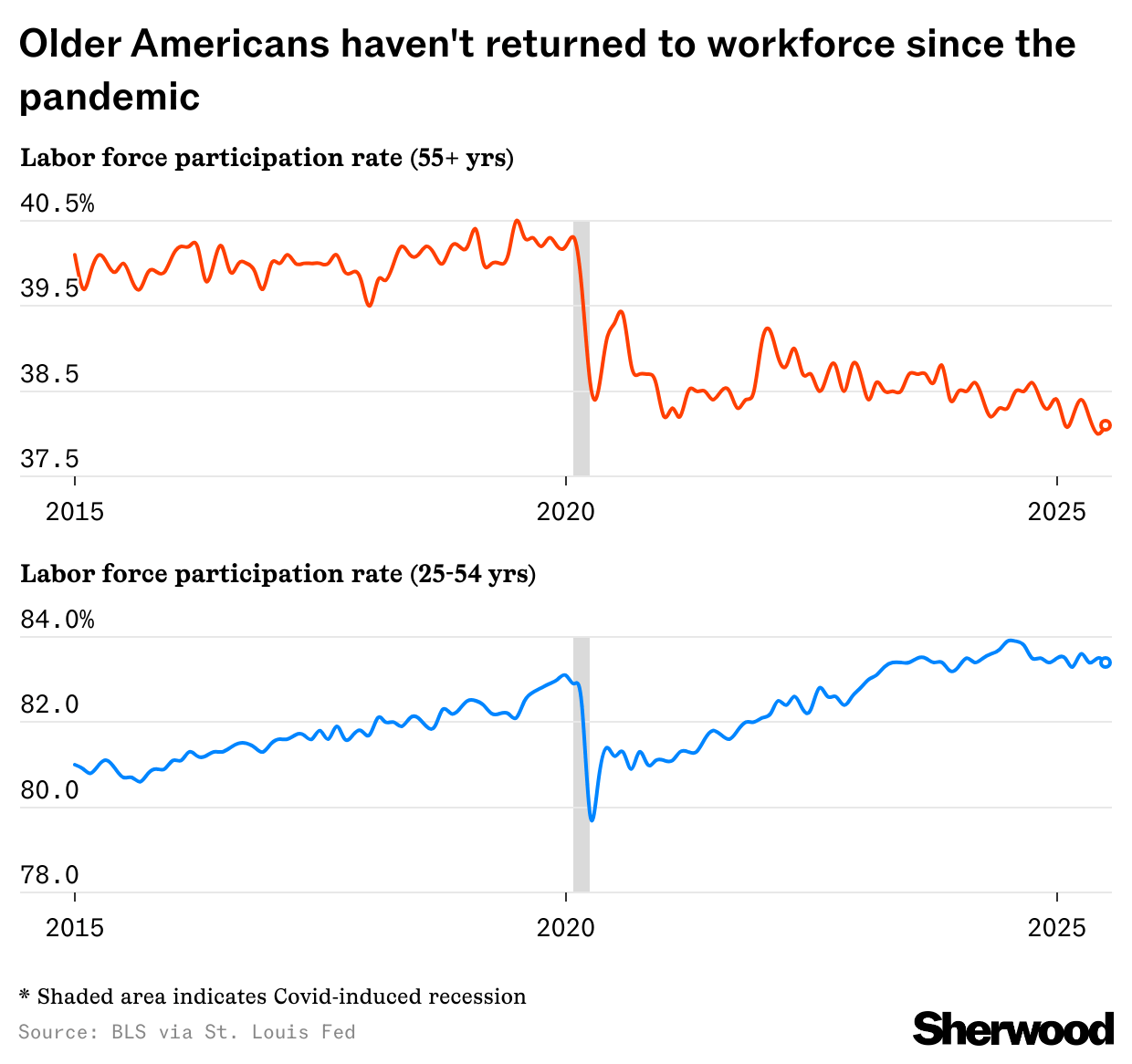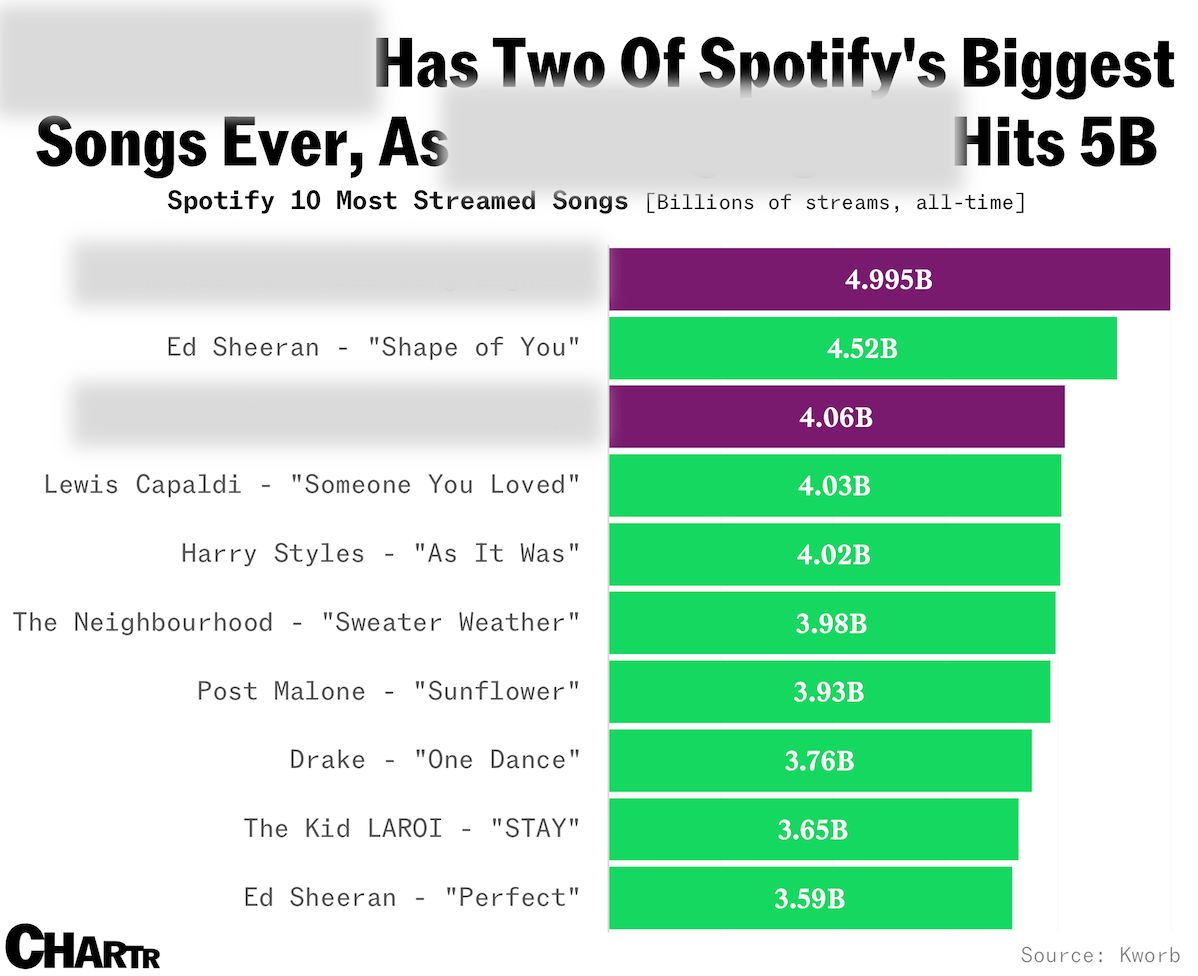Hi! Can I get 18,000 water cups, please? Yum! Brands is reconsidering its rollout of AI drive-thru technology as Taco Bell customers, frustrated by the tech's glitchy performance, have taken to trolling the system with ridiculous orders. Today we're exploring: |
- Pop tops: "K-Pop Demon Hunters" is now Netflix's most viewed film.
- NV of the world: How Nvidia stacks up against the UK's biggest stock index.
- The Great Retirement Boom: Older Americans still haven't come back to work yet.
|
Have feedback for us? Just hit reply - we'd love to hear from you! |
"K-Pop Demon Hunters" just became Netflix's most watched film |
Netflix's Korean-inspired hits just keep on coming, as "K-Pop Demon Hunters" becomes the streamer's most watched film of all time, racking up 236 million views since its June 20 release. In just over two months, Netflix and Sony Pictures Animation's animated musical has surpassed "Red Notice," the 2021 Ryan Gosling film that previously held the record with 231 million views in its first 91 days. Due to a slightly shorter runtime, "KPDH" hasn't quite taken the title of most hours viewed, but — given its freakish trajectory, which is showing basically no signs of slowing down — the title will very likely take the top spot on that metric too. |
That's on top of scoring the theater-averse streamer's first box office number one last weekend, thanks to a sing-along version of the movie. |
Unlike other movies in Netflix's ranks that peak in their first week of release before slowing down, KPDH has gained popularity a little more steadily, raking in an average of 43 million hours viewed per week in the last 3 weeks of data reported. That unusual staying power is in part the result of millions of kids who are reportedly watching the movie 6 to 8 times on average (or even more for some) — an enthusiastic audience that's frequently driving the top of the charts in the world of TV, too. Alongside a flurry of celebrations around the film's Billboard chart performance and potential Oscar ambitions, Netflix shareholders will be pleased to know that the streamer also owns KPDH's merchandising rights. Naturally, they're already talking about a sequel. |
Nvidia traded $50 billion yesterday — that's more than 15x what the entire FTSE 100 did in London |
Nvidia did just enough in its Q2 results this week to keep the AI train rolling. Some investors saw the slight data center miss as a concern; others — including most Wall Street analysts — were satisfied by the continued demand for Blackwell chips. The net result of those opposing arguments was that more than $50 billion changed hands in Nvidia yesterday... and the stock closed within 1% of where it was the day before. $50 billion is a lot of money. It's the most Nvidia has traded since May, and it was the most of any stock in the US yesterday. Such is the insatiable appetite for exposure to AI and the depth of the US capital markets that one stock can turn over $7.7 billion an hour, or more than $2 million per second, for an entire trading session. |
For British policymakers, it's a timely reminder of just how sluggish the UK equity markets scene is: Nvidia turned over 15.6x what the entire flagship index of the UK's stock market traded in London. Indeed, all 100 names in the FTSE index traded the equivalent of only a paltry $3.2 billion on-exchange yesterday, per data from Bloomberg. |
The hottest stock on London's tape was British American Tobacco, which traded about $157 million, a little over two minutes' worth of typical NVDA action. OK, you might be saying, but Nvidia is Nvidia! It's the AI golden goose. Perhaps more startling, then, is the fact that Nvidia was one of 16 US stocks to trade more than the entire FTSE 100. The final name on that list is MongoDB, which had a good day, rising 7%. But if a random database company — which most people probably haven't heard of — is trading more than your entire flagship stock market index, you might have a problem. |
|
|
The Key to a $1.3 Trillion Market |
As a trusted asset, it's no wonder that 40% of wealthy Americans want to buy second homes. In fact, for younger HNWIs, real estate investments still ranked above crypto and digital assets as opportunities for growth in a 2024 study by Bank of America. |
While crypto has been popular for wealthy Americans, real estate continued to hold greater appeal. And it's the smart real estate entrepreneurs that know where to disrupt. Take the $1.3T vacation home market1, where houses have traditionally been too expensive or too much hassle. After selling his own company to Zillow for $120M, Austin Allison applied his proptech expertise to create Pacaso: a co-ownership platform for luxury vacation homes. Since inception, the company has generated $1B+ worth of luxury home transactions and service fees across 2,000+ owners. Well-known VCs have already invested — and until 9/18, Pacaso is offering everyday investors the chance to share in their growth at $2.90/share.2 |
|
|
Older Americans haven't returned to work — they may stay out longer yet |
The pandemic scrambled the US labor market in countless ways, but one of the stickiest changes might be the exodus of workers. In early 2020, the labor force participation rate plunged to a 50-year low, and still hasn't fully recovered to pre-pandemic levels. Many workers, across all age groups, left the job market during Covid, from health concerns to childcare hurdles to sheer burnout. But one cohort in particular hasn't returned like others: older Americans. |
According to the St. Louis Fed, prime-age workers (aged 25-54) have fully bounced back, with their participation rate now above pre-pandemic levels. Those 55 and older, however, remain about 2 percentage points below their pre-Covid participation rate. |
The Great Retirement Boom |
Older Americans' mass exit was first triggered by what economists call "excess retirements." Over 2 million extra retirees left the workforce during 2020-22, above what demographic trends would have predicted — accounting for more than half the rise in total retirements during those years, according to Fed researchers. Many of those early exits came from lower-income workers pushed out by job losses, who ended up relying on expanded unemployment benefits. At the other end, wealthier Boomers rode the 2020–21 asset boom — stocks surged and home values jumped ~20% — giving many the means to match their mindset to retire sooner. By early 2025, however, excess retirements had faded toward normal levels. But broader demographic trends are now the drag: nearly a third of the 55+ workforce is now 65 or older, as Boomers are aging into retirement en masse — while the younger population isn't growing fast enough to offset it. |
|
|
- Stop making Ssense… The Canadian luxury fashion e-retailer filed for bankruptcy on Thursday, as sales slumped on the back of tariffs and the end of the de minimis exemption.
- Over half of Nvidia's direct hardware sales revenue comes from just three customers — with the largest single buyer in the segment making up 23% of Q2 sales, equivalent to $9.5 billion.
- Delta Air Lines agreed to pay ~$79 million for dumping about 15,000 pounds of fuel over schools and homes in Los Angeles back in 2020.
- Last month, BYD sold nearly 50% more vehicles in the EU than Tesla did, per new data from the European Automobile Manufacturers' Association.
- What the Deuce? One Honey Deuce, the US Open's signature cocktail, is being sold every 1.5 seconds during the tournament.
|
|
| Five years ago, a former Zillow exec took to the $1.3T vacation home market1 and co-founded Pacaso. Since then, they have produced over $110M in lifetime gross profit3 — and now Pacaso is looking for early investors to share in their growth.2 |
|
|
- Pew Research Center explores how the readership of different news publications varies by age.
- Food fight! Pictures from the 80th annual Tomatina festival in Spain this week.
|
Off the charts: Which artist occupies 2 of the top 3 spots on Spotify's ranking of the most streamed songs ever… one of which is about to cross 5 billion streams? [Answer below]. |
Not a subscriber? Sign up for free below. |
Advertiser's disclosures: 1 Pacaso estimates the U.S. market at $1.3 trillion and the European market as $500 billion. See website for further details. 2 The minimum investment is $1,035.52 when including the 3.5% investor fee. This is a paid advertisement for Pacaso's Regulation A offering. Please read the offering circular and related risks at invest.pacaso.com. Investing in private company securities is not suitable for all investors because it is highly speculative and involves a high degree of risk. It should only be considered a long-term investment. You must be prepared to withstand a total loss of your investment. Private company securities are also highly illiquid, and there is no guarantee that a market will develop for such securities. 3 Please see financials for more information. There is $100M gross profit calculated from 2021-2024. For more details on the gross profit for 2021-2023, please see management discussion of the financial condition section of the offering circular. For more details on the 2024 gross profit, please see the 1-K Financial Statements section. Past performance is not indicative of future results. |
Sherwood Media, LLC produces fresh and unique perspectives on topical financial news and is a fully owned subsidiary of Robinhood Markets, Inc., and any views expressed here do not necessarily reflect the views of any other Robinhood affiliate... See more |
|
|
|


.png)


.png)



No comments:
Post a Comment